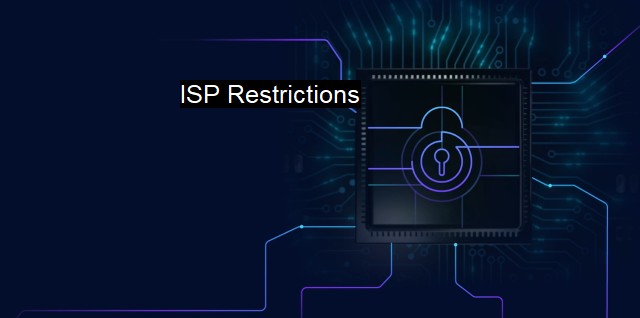What are ISP Restrictions?
Understanding ISP Restrictions: Safeguarding Cybersecurity and Protecting Networks
Internet Service Providers (ISP) are pivotal players in ensuring you access the internet data realm. They provide users with the paths to cruise the World Wide Web and interact with digital content. ISPs are not just facilitators but gatekeepers too. They impose what are seemingly known as "ISP Restrictions". Naturally, these restrictions bring a considerably essential discussion within cybersecurity and antivirus context.Cybersecurity aims to secure devices, servers, systems, and data from cyber threats. The ambit includes protecting against data breaches, ensuring data privacy, avoiding damage from cyber attacks, and keeping the company's infrastructure safe and running. On the other hand, antivirus software serves as a protective measure on the local device, preventing malicious programs from infiltrating your system. While these are individual layers of protection, when it comes to overall internet access, we encounter ISP restrictions.
ISP restrictions refer to the practice of limiting or controlling users' internet access or activities. ISPs enforce these restrictions for diverse reasons — to manage network congestion, adhere to regulatory requirements, implement fair usage policies, or even meet commercial goals. These controls could manifest by blocking certain websites, slowing down internet speed (also known as throttling), data capping, or controlling bandwidth.
Within the ambit of cybersecurity, ISP restrictions come up as a double-edged sword. On one side, ISPs may inflict these restrictions to enforce safety measures. To illustrate, restricting access to known malicious sites can prevent users from inadvertently downloading harmful or malicious content. Careful regulation can limit the spread of viruses, malware, and other digital threats, contributing to a safer and more secure online environment.
On the flip side, ISP restrictions can potentially limit the effectiveness of cybersecurity practices. For instance, if an ISP throttles or reduces the internet speed during a cybersecurity update or data backup, thereby prolonging the process, these systemic delays could create windows of vulnerability, exposing the system to potential cyber threats.
Around the antivirus context, ISP restrictions can influence the efficacy of antivirus software operations. ISPs may throttle data, slowing down necessary antivirus updates. This could lead to having obsolete antivirus systems that leave your device vulnerable to new threats. Conversely, ISPs are capable of restricting access to dangerous sites, hindering the chance of downloading potential malware.
ISP restrictions, part of network neutrality debates, tend to produce ethical and legal connotations. For instance, some claim that throttling discriminates against specified online services, breeding a less competitive and innovative digital market. On the contrary, others argue that providers should have the freedom to manage their networks, maintaining quality standards while dealing with network congestion.
Thus, in observing the domain of cybersecurity and antivirus, ISP restrictions brings about different impacts that are indispensable to this digital age discussion. On one hand, these restrictions can potentially enforce a safer and more secure digital environment preventing cyber threats and harmful content. On the other hand, these restrictions can potentially limit the avenues of robust cybersecurity practices, antivirus software capacities, and a free and fair digital environment. It seems to be a challenge finding the equilibrium between regulation and freedom, security and accessibility within this networked labyrinth. Policymakers, ISPs, and users need to forge a renewed understanding to protect the cyber world while fostering freedom and versatility in the digital age, nudging it towards universal beneficial growth.

ISP Restrictions FAQs
What are ISP restrictions?
ISP restrictions are limitations or rules that Internet Service Providers (ISPs) impose on their customers' usage of the internet. These restrictions can be related to cybersecurity and antivirus measures and involve limiting access to certain websites or services that may pose a threat to the network's security.Why do ISPs impose restrictions?
ISPs impose restrictions to protect their network and their customers from cyber threats, which can cause potential harm or damage. Restrictions can also help in managing network traffic and preventing the spread of malware and viruses.What are some common ISP restrictions related to cybersecurity and antivirus?
Common ISP restrictions related to cybersecurity and antivirus include blocking or limiting access to websites or services that are known to contain malware or viruses. ISPs may also impose bandwidth limits to prevent the spread of network congestion caused by cyberattacks. ISP's may also enforce usage policies to prevent customers from downloading files or content that may contain harmful software.How can I bypass ISP restrictions related to cybersecurity and antivirus?
It is not recommended to bypass ISP restrictions related to cybersecurity and antivirus since these restrictions are imposed to protect the network and its users. However, if a user needs to access a blocked website or service, they can use a virtual private network (VPN) to bypass the restrictions. VPNs encrypt internet traffic, making it more difficult for ISPs to identify what websites or services a user is accessing. However, it is important to note that using a VPN may not be entirely secure, and users should consider the risks before using them.| | A | | | B | | | C | | | D | | | E | | | F | | | G | | | H | | | I | | | J | | | K | | | L | | | M | |
| | N | | | O | | | P | | | Q | | | R | | | S | | | T | | | U | | | V | | | W | | | X | | | Y | | | Z | |
| | 1 | | | 2 | | | 3 | | | 4 | | | 7 | | | 8 | | |||||||